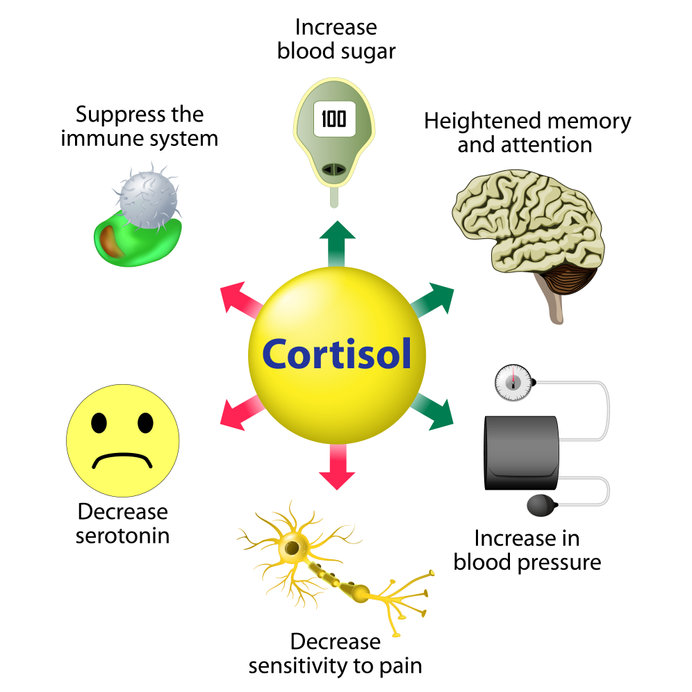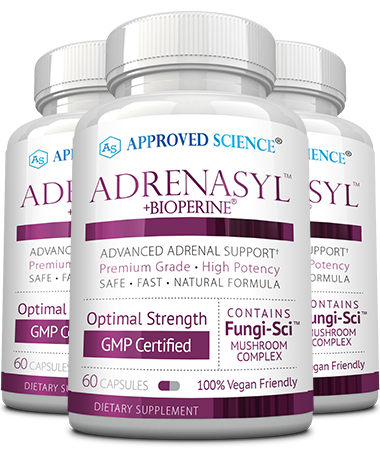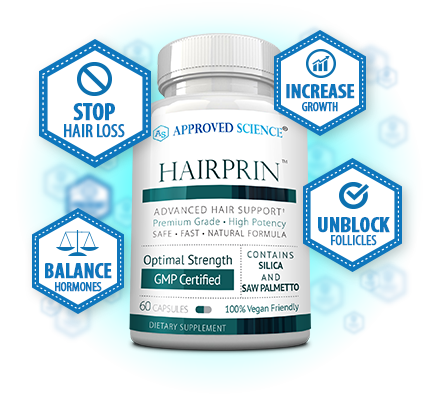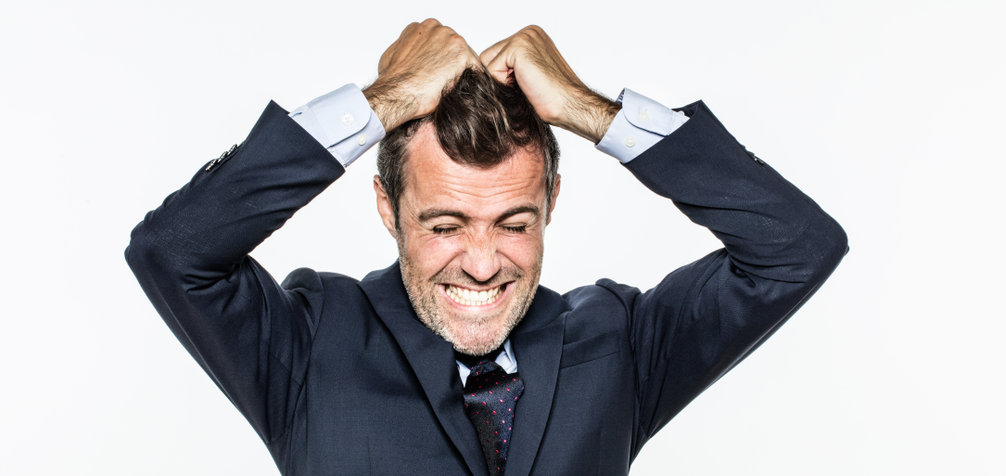Hair loss is an unpleasant sign of aging that affects both men and women, but there are also several additional factors that influence hair loss beyond aging. Whether you’re working a high-pressure job and experience frequent bouts of anxiety or are juggling multiple responsibilities at home that lead to tension, stress is a more common contributor to hair loss than many may have originally thought. This is especially evident because of the impact that cortisol has on hair growth. In this article, we will discuss how stress and cortisol affect hair loss and suggest ways that you can manage hair loss.
What Is Cortisol And How Does It Impact The Body?

Before we can understand how stress and cortisol affect hair loss, we need to develop a clearer understanding of what cortisol is and how it impacts overall wellbeing.
Cortisol is a steroid hormone that is released alongside adrenaline in the adrenal gland during times of stress. Simply put, cortisol is a natural alarm system that is triggered in response to stressful situations and it impacts one’s mood, feelings of fear, and other brain reactions. Cortisol, when balanced, has several impacts on the body according to authoritative sources, and we have listed them below for your convenience:
- Interacts with your body’s use of carbohydrates, fats, and proteins
- Reduces inflammation
- Controls blood pressure
- Raises blood sugar levels
- Effects your sleep/wake cycle
- Supports and promotes energy levels
How Does Cortisol Affect Hair Loss?
With a better understanding of how cortisol correlates with feelings of stress and how it impacts the body, let’s take a closer look at the ways in which stress and cortisol affect hair loss particularly.
According to studies, cortisol is said to impact the functioning and regulation of hair growth in the hair follicles. High levels of cortisol in the body have been found to damage and/or reduce the synthesis of skin elements, leading to stress-related hair loss as a result of poorer performing hair follicles.
These studies suggest that there may be an important link between stress, cortisol, and hair loss, however, cortisol is not the only byproduct of stress that affects hair loss. In fact, stress may affect hair loss in several additional ways.
Other Ways Stress Affects Hair Loss
There are three primary conditions that affect hair loss that can be triggered by high levels of stress. We will discuss these in more detail below.
Telogen Effluvium
Individuals experiencing this particular condition suffer from hair loss as a result of large numbers of hair follicles entering a resting phase in which hair no longer continues to grow from them. The hair remaining may fall out while bathing or brushing, leaving patches of hair loss that may not grow back. It is rare for someone to experience total hair loss from this condition, however, hair in other parts of the body may also begin to fall out as a result of the condition.
Trichotillomania
This impulsive control disorder may be triggered by high levels of stress over long periods of time, and it causes individuals to experience an irresistible urge to pull out their own hair. Excessive hair pulling may damage the hair follicles and prevent them from producing strong locks in the future, leading to a gradual loss of hair with time.
Alopecia Areata
Severe chronic stress may occasionally lead to this condition in which the body’s immune system attacks the hair follicles, resulting in hair loss. The entire scalp is vulnerable to hair loss as a result of this health condition, and there is no known cure for the autoimmune disease.
In all instances, managing stress through the regulation of cortisol production may help reduce the onset of these conditions as well as hair loss as a result of aging.
How To Balance Cortisol Production In The Body

With regards to cortisol, management of its production is essential to experiencing the benefits of it rather than potential negative side effects of too much cortisol production, such as hair loss. For this reason, individuals may wish to supplement their diets with a quality adrenal support formula derived from a supplement such as Adrenasyl™ by Approved Science.
This particular product contains several beneficial ingredients that regulate the production of cortisol, and possesses additional healthy ingredients for added wellbeing benefits. For example, the presence of the natural and patented Fungi-Sci mushroom blend contains high concentrations of adaptogens which studies highlight have an effect on the central nervous system as well as an individual’s experience with stress. The inclusion of ingredients such as Zinc and Bioperine serve to boost the cortisol balancing potential of the formula and promote the absorption of vital vitamins, nutrients, and minerals respectively.
The use of supplements such as an adrenal support formula should support one’s response to stress and help minimize the impacts that negative levels of cortisol have on the body. The benefit of this includes experiencing fewer signs of hair loss as a result of stress and aging.
Additional Stress Management Tips To Reduce Hair Loss
Beyond supplementing your nutrition with a high-quality cortisol supplement like an adrenal support formula, there are an array of alternative stress management techniques to reduce your experiences with it as well as decrease hair loss. We have listed some helpful suggestions below.
Consume Additional Supplements

Beyond supplementation through an adrenal support formula, hair loss can be prevented through the consumption of additional supplements over and above cortisol-enhancing products. This is especially important as cortisol regulation only prevents hair loss. With regards to hair support supplements like Hairprin™, this formula is designed to strengthen the hair follicles, encourage the growth of strong and healthy hair, as well as provide the body with vital nutrients necessary for hair growth. The combination of both supplements should help reduce hair loss while promoting hair growth, offering a dual-action benefit to consumers.
Eat Healthy And Nutritious Foods
Supplements surely help ease healthy practices, but they cannot be effective without proper healthy eating habits. Diet and nutrition play a pivotal role in hair health, and you need to create a meal plan that includes quality food groups to experience the least hair loss as a result of stress. For one thing, healthy foods help fight stress – such as Omega 3 fatty acids that promote brain and hair health. The combination of a healthy diet including the following foods and supplements should work wonders;
- Citrus fruits
- Broccoli
- Spinach
- Avocados
- Olive oil
- Shrimp
- Beans
- Nuts
- Fish
Exercise And Meditate
The final step to harnessing the benefits of a healthy and balanced lifestyle for the prevention of hair loss and regulation of stress and cortisol is exercising regularly and practicing mindful meditation. The two practices go hand in hand, with individuals often concluding exercise with a wind-down meditation. With regards to exercising, you may wish to also practice yoga which is meditative in and of itself. Whether you wish to hit the gym or perform a variety of yoga poses, exercise is essential for fighting hair loss according to studies.
The Bottom Line
Stress and cortisol affect hair loss, but individuals don’t have to suffer from hair loss conditions through the implementation of a few healthy habits. The combination of quality adrenal support formulas, additional hair growth supplements, a healthy and balanced diet, and regular exercise should have positive effects on the hair follicles and ensure that you have a full head of hair for longer.

